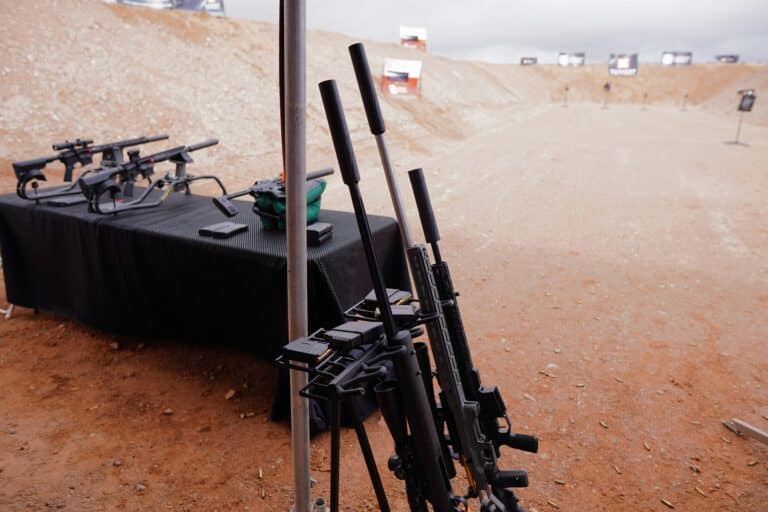Silencer deregulation is now the closest it’s ever been to becoming a reality.
On Thursday, the House of Representatives passed its budget bill with a provision that takes silencers out of the National Firearms Act (NFA) of 1934. It now heads to the Senate, where it is a very small part of a very big bill. And a must-pass bill that needs just 50 votes to pass at that.
It may not be smooth sailing once the Senate gets ahold of the bill, though.
Certainly, bundling the effort as part of a much larger budget bill is the best chance it has of getting through this Congress. That 50-vote Senate threshold will be a huge advantage for gun-rights activists backing the bill. There is next to no chance a bill delisting silencers from the NFA could get the 60 votes needed to clear a filibuster. The Hearing Protection Act, a standalone bill that delists silencers, hasn’t garnered a single Democratic co-sponsor for several Congresses in a row, and Mike Crapo (R., Idaho), one of its co-sponsors, recently told me on the podcast it isn’t likely to get more than a few Democratic votes on its own.
The House version fares a bit better, with one Democratic co-sponsor and 85 Republicans. But there are doubts over whether it could get through, given that chamber’s tight margins and likely opposition from Republicans like Pennsylvania’s Brian Fitzpatrick.
So, budget reconciliation offers gun-rights activists more hope of achieving their goal. Certainly, that’s what drove them to savage a less ambitious plan to just cut the NFA’s silencer tax to zero that House Ways and Means Committee Republicans had initially passed. Gun Owners of America went so far as to call it a betrayal and accused the committee of trying to save the NFA’s registration rules.
Those Republicans have argued they aren’t opposed to delisting silencers, but the gun-rights groups are miscalculating on what can get through reconciliation. The sticking point is over what the Senate Parliamentarian will allow under the Byrd Rule. The half dozen sources I spoke with on either side of the fight came to starkly different conclusions about what’s allowed.
The Byrd Rule forbids provisions that deal with “extraneous matters.” There are six definitions for what that means. The most relevant one to silencer delisting is likely the ban on provisions that produce “a change in outlays or revenues which is merely incidental to the non-budgetary components of the provision.”
The gun-rights advocates, as shown in this Gun Owners of America fact sheet, argue the NFA is a tax, and the registration requirements in it are merely mechanisms to enforce that tax. So, eliminating registration and the other regulatory requirements associated with the NFA is not “extraneous,” and delisting silencers should be allowed.
However, the Ways and Means Republicans disagree. They argue since the main goal of delisting is not to affect the NFA’s tax, but rather to eliminate the other requirements in the law, the Parliamentarian will rule against it. They say they looked into the idea of including delisting but were warned by a former Parliamentarian that it wouldn’t work, which is why they went with the tax cut instead.
Still, everyone seems to agree that the Parliamentarian will probably approve eliminating the silencer tax. In fact, some on the gun group side argue the tax provision works as a kind of fallback. That way, even if delisting gets canned, the tax cut can still serve as a consultation.
On the Ways and Means side, they fear delisting silencers from the NFA while also eliminating the tax on them could be ruled as redundant, or the whole section could be tossed out under the Byrd Rule instead of just one part of it. In other words, adding the delisting provision risks ending up with no reform at all.
But that could happen even if delisting or the tax survives the Byrd Rule. The fact that the fiscal impact of the tax repeal is just $1.4 billion over 10 years, a tiny percentage of the overall budget, may work in either direction. It’s unlikely to be enough money to work as a meaningful bargaining chip to settle disputes over things like Medicaid cuts or SALT write-off limits. But it could also easily be swept away if enough Republican Senators think it isn’t worth the squeeze of potentially negative publicity.
That’s one of the risks of the hard-nosed public push the gun-rights groups pursued against the Ways and Means Republicans, which those Republicans didn’t know was coming. If the public backlash doesn’t work, they’ll end up getting what the Republicans they torched were trying to deliver in the first place–or nothing at all. And they’ve likely alienated them, which makes them and perhaps other Republicans less inclined to stick their neck out in the future.
Although if it does work, it’ll have been worth it. Silencer deregulation has been a top priority of the gun-rights movement for a very long time. Plus, if the gun groups prove to be right, the public pushback could convince Republicans they need to take a more aggressive tack going forward to stay in those groups’ good graces–especially since they were savvy enough to suss out the right play.
The ultimate bet is over who is interpreting the Byrd Rule correctly. If the gun groups end up getting silencers delisted from the NFA, I doubt they’ll fret much over whether they alienated some House Republicans along the way. If not, though, their pull on Capitol Hill will be further diminished for no gain.







2 Responses
I am very pro-2nd Amendment advocate and owner of multiple suppressors. However, I have significant concerns with the provisions of the Big Beautiful Bill that delist suppressors and adjust the provisions of the NFA regarding suppressors. While I would fully support these moves through the legislative process I’m concerned with handling these policy moves through reconciliation is potentially fraught with long term peril. Handling the gun policy changes through reconciliation opens the door for the Democrats to make similar moves the next time they control congress. If we can delist items from the NFA, they could add items to the NFA. If we can reduce taxes and fees to affect pro-2nd Amendment policy changes, they could make moves to drastically increase taxes and fees to achieve anti-gun policy. Both the NFA and the Pittman-Robertson Act would offer them the opportunity to attack gun rights under this precedent. To make matters worse it would be politically difficult for even a Republican president to veto a bill with negative 2A provisions attached to an overall funding bill for the Federal Government. I don’t want to see the current Republican controlled congress pull a Harry Reid maneuver that Republicans will rue later. I’m hoping that the Senate Parliamentarian and the Senate in a bi-partisan fashion will reject further weaponization of the reconciliation process to affect policy decisions under the the guise of fiscal issues when in relative terms the moves will have large policy effect and minimal impact on the overall Federal budget.
Yes, there is a risk that if Republicans successfully use reconciliation to delist certain items from the NFA, the Democrats can do the exact opposite move the next time they’re in power. That is something worth considering.